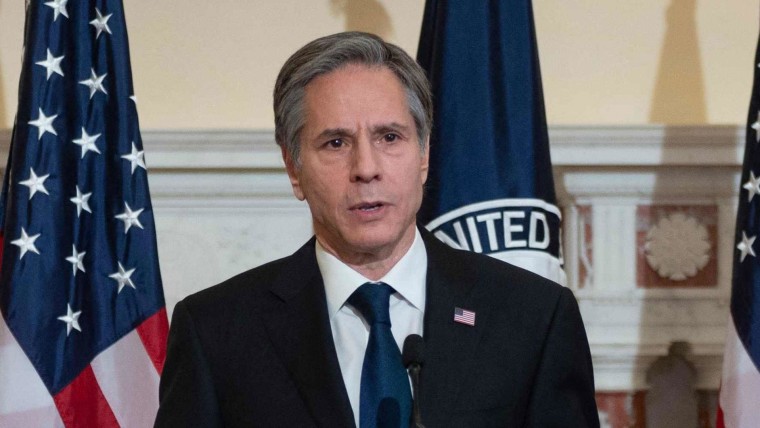For 25 years, Hong Kong, a bustling international hub, proudly led a major ranking of the world's freest economies. Now, it doesn't even feature.
The latest edition of the Heritage Foundation's annual "Index of Economic Freedom," released Thursday, saw Hong Kong excluded from the list it once dominated because its policies are "controlled from Beijing."
The news comes on the eve of China's annual National People's Congress, which gets underway in Beijing on Friday with greater control over the territory seemingly on the agenda.
Last year's event saw Beijing unveil a sweeping national security law that it has since imposed,putting the global financial hub more firmly on an authoritarian path despite months of fierce protests.
The United States, its allies and international human rights organizations have heavily criticized China over the law, which they say has undermined the city's autonomy and helped Beijing crush dissent.
Now, China's rubber-stamp parliament will propose ways to "improve" Hong Kong's electoral system to ensure there are "patriots governing Hong Kong," the body's spokesperson Zhang Yesui said Thursday — confirming widespread reports of imminent further changes to the city's political fabric.
Download the NBC News app for full coverage of the coronavirus outbreak
"Developments in recent years have demonstrated that many of Hong Kong's policies are ultimately controlled from Beijing," Anthony Kim, editor of the Index of Economic Freedom, told NBC News.
Kim said "the loss of political freedom and autonomy" in the city over the past two years had "made Hong Kong almost indistinguishable, in many respects, from other major Chinese commercial centers." He noted, however, that both Hong Kong and Macau enjoy greater economic freedoms than cities in the mainland.
The index report added that going forward, both Hong Kong and Macau would be considered in the context of China's ranking, which came in at 107 out of 178 nations — among countries deemed "mostly unfree."
The first place on the rankings from the index, which is produced by the right-leaning Washington-based think tank The Heritage Foundation, was instead scooped up by nearby Singapore for the second consecutive year.
The United States ranked in 20th place.
Hong Kong Financial Secretary Paul Chan Mo-po pushed back against the ranking Thursday.
He said Hong Kong's "core economic competitiveness" remained strong under the "one country, two systems" arrangement, which governs its relations with mainland China since British colonial rule ended in 1997.
"I do not agree that our economic policy has been taken over by the central government," he told an online panel organized by The South China Morning Post.
"The decision of excluding Hong Kong from the report is not justified. It seems to me, when they arrived at that decision, it must have been clouded by their ideological inclination and political bias."
But a separate report published this week said Beijing had been responsible for the "demolition of Hong Kong's liberties and legal autonomy," and was eroding human rights — charges it frequently denies.
The annual report by Freedom House, a U.S.-based democracy watchdog group, found that global freedom in general was waning — with almost 75 percent of the world's population last year living in countries facing democratic decline.
China, India and the United States, which faced an outgoing leader who contested election results and an outburst of political violence with a riot at the Capitol on Jan. 6, were among the nations facing democratic deterioration, it said.
"Right now, Hong Kong is at a challenging juncture. ... Time will tell how the city can regain its vibrancy," academic and former Hong Kong Housing Minister Anthony Cheung Bing-leung said. "It is too presumptive for some observers to conclude that Hong Kong is no different from mainland cities."
Authorities have said the security law was necessary to restore stability after the anti-government and anti-China protests that rocked the territory for months in 2019.
The law, which has reshaped Hong Kong's economic and political landscape, was first announced ahead of the huge and highly choreographed set piece of the Chinese political calendar, known as the "two sessions."
The event was delayed by two months last year due to the Covid-19 pandemic.
This year's congress will get underway Friday with around 5,000 Chinese Communist Party delegates expected to fill the Great Hall of the People — built under Mao Zedong.
Beijing will likely use the 13th National People's Congress to showcase its efforts at economic growth after navigating the pandemic, but China watchers will be looking for clues of leader Xi Jinping's bid for a competitive edge against Washington.
Hong Kong is one of many flashpoints for U.S.-China tensions, with Secretary of State Antony Blinken saying Wednesday that China represented America's "biggest geopolitical test of the 21st century."
He added that it was the only country with enough power to jeopardize the current international order.
"Our relationship with China will be competitive when it should be, collaborative when it can be, and adversarial when it must be," he said, in a speech laying out the Biden administration's foreign policy vision.
Reuters contributed to this report.
Article From & Read More ( Hong Kong's vanishing freedom on the agenda as China's annual congress begins - NBC News )https://ift.tt/3kMfpTv
World
Bagikan Berita Ini















0 Response to "Hong Kong's vanishing freedom on the agenda as China's annual congress begins - NBC News"
Post a Comment